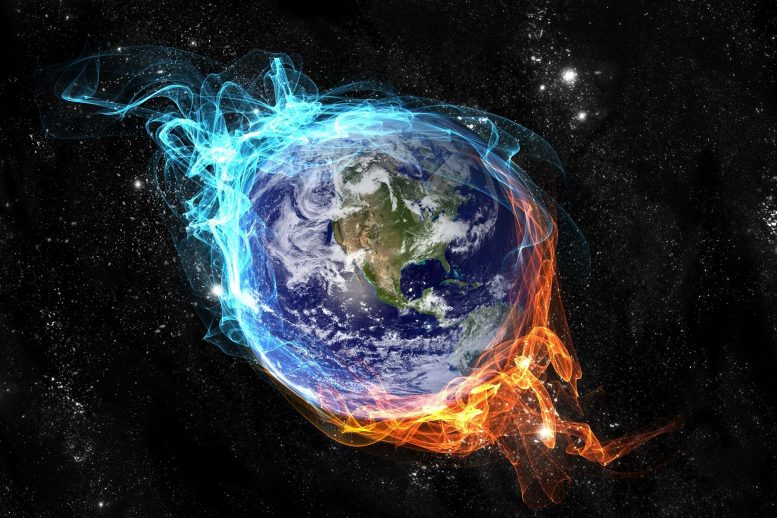
A recent paper emphasizes broader strategies for tackling climate change, including addressing CO2 sensitivity, aerosol impacts, and policy measures. It predicts accelerated global warming and underscores the need for political action against environmental degradation driven by financial interests.
According to a recent paper in Oxford Open Climate Change, published by Oxford University Press, effective strategies to combat climate change must encompass more than just reducing greenhouse gases. This comes from an analysis of climate data led by researcher James Hansen.
Scientists have known since the 1800s that infrared-absorbing (greenhouse) gases warm the Earth’s surface and that the abundance of greenhouse gases changes naturally as well as from human actions.
Roger Revelle, who was one of the early scientists to study global warming, wrote in 1965 that industrialization meant that human beings were conducting a “vast geophysical experiment” by burning fossil fuels, which adds carbon dioxide (CO2) to the air. CO2 has now reached levels that have not existed for millions of years.
Climate sensitivity
A long-standing issue concerns how much global temperature will rise for a specified CO2 increase. A 1979 study released by the United States National Academy of Sciences concluded that doubling atmospheric CO2 with ice sheets fixed would likely cause global warming between 1.5 and 4.5° Celsius.
This was a large range, and there was additional uncertainty about the delay in warming caused by Earth’s massive ocean. This new paper reevaluates climate sensitivity based on improved paleoclimate data, finding that climate is more sensitive than usually assumed.
Their best estimate for doubled CO2 is global warming of 4.8°C, significantly larger than the 3°C best estimate of the United Nations Intergovernmental Panel on Climate Change.
Aerosols
The authors also conclude that much of the expected greenhouse gas warming in the past century has been offset by the cooling effect of human-made aerosols – fine airborne particles. Aerosols have declined in amount since 2010 as a result of reduced air pollution in China and global restrictions on aerosol emissions from ships.
This aerosol reduction is good for human health, as particulate air pollution kills several million people per year and adversely affects the health of many more people. However, aerosol reduction is now beginning to unmask greenhouse gas warming that had been hidden by aerosol cooling.
The authors have long termed the aerosol cooling a “Faustian bargain” because, as humanity eventually reduces air pollution, payment in the form of increased warming comes due.
Prediction
This new paper predicts that a post-2010 acceleration of global warming will soon be apparent above the level of natural climate variability. The 1970-2010 global warming rate of 0.18°C per decade is predicted to increase to at least 0.27°C per decade during the few decades after 2010. As a result, the 1.5°C global warming level will be passed this decade and the 2°C level will be passed within the following two decades.
Policy
In a final section, Hansen describes his perspective based on decades of experience in trying to affect government policies. First, he believes that the achievement of rapid phasedown of CO2 emissions requires a rising domestic carbon fee with a border duty on products from nations without a carbon fee, as well as the support of modern nuclear power to complement renewable energies.
Second, he argues that the West, which is primarily responsible for climate change, must cooperate with developing nations to help them achieve energy paths consistent with a propitious climate for all.
Third, even with these efforts, Hansen believes that global warming will reach levels with dangerous consequences; he argues we should also carry out research and development for temporary, purposeful, actions to address Earth’s now enormous energy imbalance.
A decade ago, Hansen noted that Earth was out of energy balance by 0.6 W/m2 (watts per square meter). There was that much more energy coming in (absorbed sunlight) than going out (heat radiation to space). That excess – which is the proximate cause of global warming – is equivalent to 400,000 Hiroshima atomic bombs per day, with most of that energy going into the ocean.
Now, largely because of decreasing aerosols, the imbalance has doubled to about 1.2 W/m2. This huge imbalance is the proximate cause of accelerated global warming and increased melting of polar ice, which is likely to shut down overturning ocean circulations and cause large, rapidly rising, sea levels later this century.
The paper argues that such action will be essential to avoid the greater geotransformation that will occur in the absence of such action. Potential actions include injection of stratospheric aerosols, for which volcanoes provide relevant but inadequate test cases, and spraying of salty ocean water by autonomous sailboats in regions susceptible to cloud seeding.
Hansen suggests that young people focus on an underlying problem that has developed in Western democracies, especially the United States: “The ideal of one person/one vote has been replaced by one dollar/one vote,” Hansen argued. “Special financial interests – the fossil fuel industry, the chemical industry, the lumber industry, the food industry, for example – are allowed to buy politicians. It is no wonder that climate is running out of control, environmental toxicity is in the process of exterminating insects including pollinators, forests are mismanaged, and agriculture is designed for profit, not for nutrition and the public’s well-being.”
“We live on a planet with a climate characterized by delayed response, which is a recipe for intergenerational injustice,” Hansen continued. “Young people need to understand this situation and the actions needed to assure a bright future for themselves and their children.”
Reference: “Global warming in the pipeline” by James E Hansen, Makiko Sato, Leon Simons, Larissa S Nazarenko, Isabelle Sangha, Pushker Kharecha, James C Zachos, Karina von Schuckmann, Norman G Loeb, Matthew B Osman, Qinjian Jin, George Tselioudis, Eunbi Jeong, Andrew Lacis, Reto Ruedy, Gary Russell, Junji Cao and Jing Li, 2 November 2023, Oxford Open Climate Change.
DOI: 10.1093/oxfclm/kgad008










they are right, the only way to save the planet is to kill off 99% of carbon based life forms.
All we need do to save our planet from non-existent man-made climate change is grant absolute power to the wannabe banana republic dictators who want absolute power. Got it. What could be better for humanity? What could go wrong…
Wow. When Hansen tells you what an intrusive, restricting socialist he is, I guess we have to believe him.
In all seriousness, China has replaced the US in its extreme emissions and at current rates will reppace the US as the all time greatest emitter in the late 2030s. Hansens socialist assumptions are false. The east will duly replace the west as all time top emitter remarkably quickly. Its dictatorship has no such sensitivities about being blamed like the west does. China doesnt care.
The previous comments show how logical solutions are being fought with trgger words like socialist and dictator. The idea of a carbon tax actually incentivizes free market solutions. The commenters provide no evidence contrary to the science, and appear to want a continuation of business as usual, probably because they enjoy the benefits of cheap fossil fuel usage and don’t mind other people and future generations being affected by its externalities.
“… don’t mind other people and future generations being affected by its externalities.”
I’m reminded of a comment made by Carl Sagan on his COSMOS TV series. He stated that had Conestoga wagons been capable of flying, and one had left for the moon in 1850, it still would not have arrived by the time the US landed its first rocket-powered lander on the surface.
Had citizens in the world during the 18th and 19th centuries been as concerned about manure on city streets, from draught animals, as they currently are about rising temperatures, significant efforts to solve the problem would have been for naught because of the inventions that replaced the animals. As it is, one effort, the introduction of English Sparrows, has generally been viewed as a serious mistake. One should be very careful about making significant socioeconomic changes to systems because Newton’s Third Law — For every action, there is an equal and opposite reaction — seems to have a social corollary that we call ‘unintended consequences.’ Rationalizing significant changes based on one’s expectations of the future are almost certainly going to be wrong.
“… trgger [sic] words like socialist and dictator.”
They may be trigger words for some, but I think that Anonymous has used the words correctly. Are we to stop using words that are correct just because they have become pejorative?
“This new paper predicts that a post-2010 acceleration of global warming will soon be apparent above the level of natural climate variability.”
Yet, from June 2014 to April 2023 there was no statistically significant tropospheric warming.
https://wattsupwiththat.com/2023/05/02/the-new-pause-lengthens-by-two-months-to-8-years-11-months/
That ended with the current El Nino event, but temperatures appear to have already reached their peak and can be expected to continue to decline.
https://wattsupwiththat.com/2024/01/03/uah-global-temperature-update-for-december-2023-0-83-deg-c/
Alarmists do not have a good track record for their predictions.
“…, Hansen noted that Earth was out of energy balance by 0.6 W/m2 (watts per square meter).”
Where are the error bars (uncertainty range) for this and the subsequent estimate of the nominal energy balance? Science recognizes that no measurement is exact and has developed techniques for assessing and communicating the certainty and precision. It is a professional touch that is all too frequently ignored in climatology.
On his TV series about life on Earth, David Attenborough has stated that the 1% of the Earth’s surface that we call the tropics, contains about 50% of the known species of life. Perhaps a warmer Earth would be beneficial for life. Maybe we should be less focused on what inconveniences us humans.
Hansen clearly hasnt kept up with reality.
By 2040 China will be the all time largest emitter in world history.
It is simply a fact that China has overwhelmed emissions that led to myopic blame imposed solely on the west. China has multiply larger emissions than the US ever had. And China will pass in 40y what the US emitted over 250y.
Its just a fact. The west doesnt have the power to imoact climate on its own any longer.